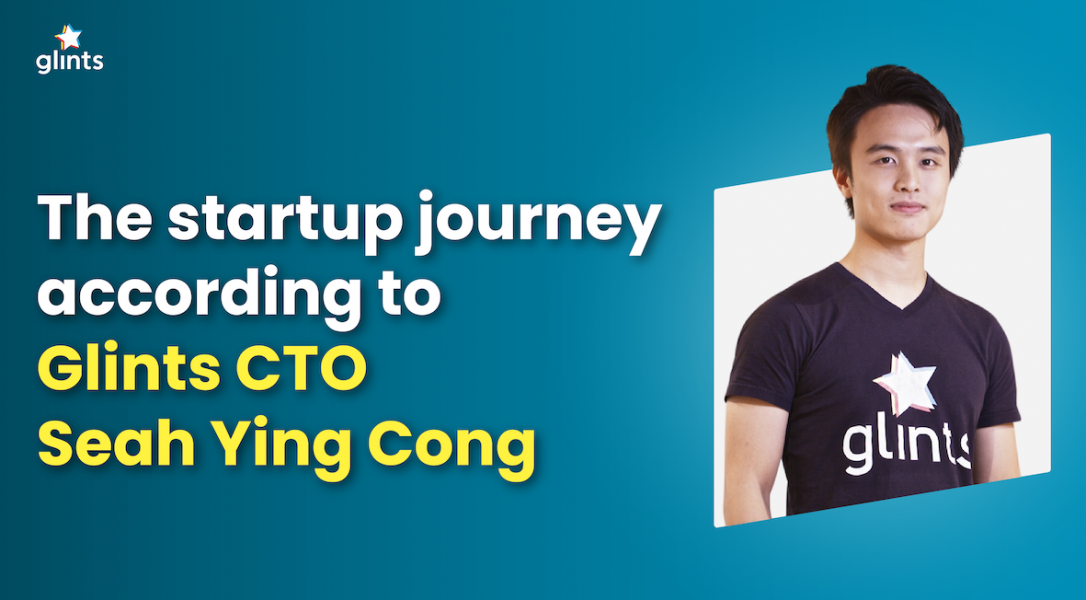4 lessons from Glints’ startup journey


Table of Contents
ToggleGlints has grown in its nine-year startup journey to be one of the leading recruitment platforms in the region.
From an after-school side hustle shared among three schoolmates, it has grown to be a specialist in sourcing tech talent from Southeast Asia for tech hubs such as Singapore and Malaysia.
The company has expanded from its base in Singapore to Indonesia, Vietnam, Malaysia, and Taiwan.
It also assists job seekers, particularly fresh graduates and interns, to match with potential employers.
In August 2022, it clinched its Series D funding worth US$50 million.
As for Glints CTO Seah Ying Cong, or YC, he went from a one-man-tech team to managing a department of 30 tech staff.
YC shared the many ups and downs he experienced as Glints CTO at Founders Fusion, a founders webinar hosted by Singapore-based incubator The Startup Buddy.
Held on 20 May 2021, the webinar was presented by Robin Teurlings, founder and CEO of The Startup Buddy Singapore.
Here are four key lessons that YC gleaned from his startup journey.
Glints started as an after-school side project that connected interns and fresh graduates to potential jobs.
YC and co-founders Oswald Yeo and Looi Qin En secured a seed round in Glints’ early days.
Soon after, they dropped out of their university scholarships to pursue Glints full time.
Just four years after they secured their seed round, Looi departed the company due to managerial differences.
YC learned that such tensions could be smoothed out much earlier.
In fact, they have to be nipped in the bud right from the start.
“If you have some fundamental disagreement in the beginning in terms of working style or vision of the company, you have to address that right from the start,” says YC.
He adds that “things will get difficult to work through” the longer you let these tensions simmer.
Furthermore, any internal conflict creates an unconducive and stressful environment for staff.
So it is important to address any fundamental differences early on, in order to prevent them from destroying employee morale.
Running Glints was the founders’ first official job. They had no prior work experience to lean on.
So they hunted for experienced mentors who would guide them along their startup journey.
YC attributes the success of Glints to the guidance of his mentors, many of whom are founders themselves.
“We were completely unschooled in the way businesses work and we had to figure a lot of things out ourselves. Our current board were all mentors beforehand,” says YC.
His advice to startup founders is to network and attend founder events to up your chances of meeting the right mentor.
YC recounted how he would apply any sage advice he received and update his mentors on their developments.
This goes some way in establishing a long-standing mentor-mentee relationship.
“You will immediately stand out from other startups,” says YC.
Robin concurred and noted that finding the right mentor is part of the startup journey.
Sometimes, mentor relationships don’t work out, too.
“You will find out if the person can help you along the way,” says Robin.
Like what you see? Subscribe to our newsletter to receive all our latest news and offers delivered right to your desk.
Startup founders pitch to investors to obtain funds for their businesses.
But YC learned the hard way that not all investors are looking for the same thing.
Some of them are looking at company ethos, while others prioritize user experience or UX.
“One misconception I had as CTO was that I thought the best product or the best UX will raise funding,” says YC.
But just because you didn’t get a nod of funding from your pitch, doesn’t mean that you are a bad company.
YC says fundraising is a process, and founders should not let some failed pitches get them down.
Robin expanded on YC’s point as the CEO of an incubator, he iterates that investors are looking at your business as a whole.
So it isn’t as straightforward as simply creating a winning product or technology, he says.
“When you are trying to get funding, the company is THE product,” emphasises Robin.
Startup life is a grind at most times.
It certainly isn’t a place for those with large but fragile egos.
Knowing how dynamic working at startups could be, he knew that he had to make humility part of Glints’ employee values.
“Having a low ego lets you resolve conflict a bit easier. That is one of the criterias we look for when it comes to hiring,” says YC.
YC can attest to these values himself. As CTO, he is still learning how to better manage his team.
This also means listening to their suggestions and requests, which could be anything from pay raises to suggestions for improvement.
To summarise, the startup journey isn’t cut and dry. Nor is it a golden ticket to immense wealth.
According to YC, it is in fact, a never-ending learning process.
.
Build your workforce from anywhere. Start your remote hiring journey with Glints.
This article is brought to you by Glints for Employers, the trusted partner of global startups and enterprises for talent recruitment and management in Southeast Asia and Taiwan. Half the time, half the cost – our expert, tech-enabled team of recruiters will help match you with skilled candidates locally and across the region, and onboard new remote talents to your business quickly and affordably.
Discover our full range of hiring services and start building great teams and capabilities today.